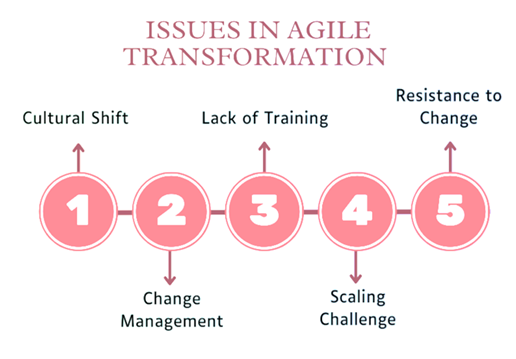Challenges in Agile Transformation: Change Management, Knowledge Dissemination, and Collaboration
AGILE
4/18/20242 min read


Agile transformation is a process that many organizations undergo to adapt to the changing business landscape and improve their efficiency. However, this transformation is not without its challenges. In this blog post, we will explore the possible problem statements that can arise during an agile transformation, with a focus on change management and change mindset issues.
In transitioning from traditional methodologies to Agile, several problem statements may arise, particularly concerning change management and mindset shifts:
Problem Statements:
Resistance to Change: Employees, particularly those accustomed to traditional methods, may resist adopting Agile practices due to fear of the unknown, skepticism about its benefits, or reluctance to leave familiar workflows
Lack of Understanding: Some team members may struggle to grasp the principles and practices of Agile, leading to confusion, frustration, and a lack of alignment within the organization
Organizational Culture Clash: Agile's emphasis on collaboration, flexibility, and self-organization may clash with the hierarchical structures and rigid processes of traditional organizations, leading to cultural friction
Incomplete or Inconsistent Implementation: Inadequate training, poor communication, or partial adoption of Agile practices can result in inconsistent implementation across teams, undermining the effectiveness of the transformation
Overemphasis on Tools: Focusing solely on implementing Agile tools without addressing underlying cultural and mindset shifts can lead to superficial changes that fail to deliver the expected benefits
Lack of Executive Support: Without strong leadership commitment and support for Agile transformation, initiatives may lack resources, authority, and organizational buy-in, stalling progress and undermining morale
Ineffective Change Management: Poorly managed change processes, including insufficient communication, inadequate stakeholder engagement, and resistance from middle management, can impede the success of Agile transformation efforts
Mindset Challenges: Shifting from a predictive, plan-driven mindset to an adaptive, iterative mindset can be challenging for individuals and teams accustomed to following strict processes and predefined plans
Silos and Resistance: Siloed departments or teams may resist collaboration and knowledge sharing, hindering Agile's emphasis on cross-functional teams and transparency
Measurement Misalignment: Traditional performance metrics may not accurately reflect the progress and value delivered by Agile teams, leading to misinterpretation of results and misalignment with organizational goals
Addressing these problem statements requires a comprehensive approach that combines training, communication, leadership support, and cultural change initiatives to foster a successful Agile transformation.
